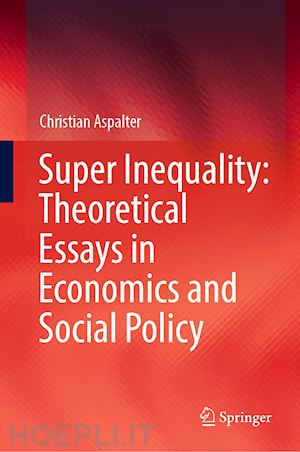
Questo prodotto usufruisce delle SPEDIZIONI GRATIS
selezionando l'opzione Corriere Veloce in fase di ordine.
Pagabile anche con Carta della cultura giovani e del merito, 18App Bonus Cultura e Carta del Docente
This book bridges the disciplines of micro-economics and social policy in general, and, in particular, behavioral/explanatory social policy and public choice theory, plus Leibenstein’s X-efficiency theory. Being trained as an economist and social policy scientist, the author leaps out of the comfort zone of most social policy scientists and experts, right into the exciting world of micro-economic theory, and then extending and connecting those theories to explain major social, political and economic conundrums of our time.
In doing so, the book offers a new set of theoretical—and practical—explanations derived from the general proposition of micro-economic theory, of how government officers, policymakers, administrators and the people themselves alike are, by and large, motivated in their daily as well as strategic (long-term) decision-making. Using a meta-analytical approach (based on a number of grand theories), this book also explains systemic factors behind human behavior and the thereof resulting shortcomings in lifetime outcomes (health, wealth and happiness of a person) and at the same time societal, policy-making, and economic outcomes on societal level, and in global comparison.
The outcomes thereof can be measured exactly (and hence validated), especially through the method of empirical comparative social science/economic research. Here, the author also (but not only) introduces the new method of using Aspalter's Standardized Relative Performance (SRP) Index in measuring exactly complex, aggregate performances of multiple governments, and that at the same time also across the entire world.
Chapter 1.- The Fascinating World of Human Action: An Introduction. Chapter 2.-The General Theory of Distorted Choices. Chapter 3. The General Theory of Z-Efficiency. Chapter 4.- The General Theory of Super Inequality. Chapter 5.- On Notions of Evolution and Development: A Concluding Note.
Christian Aspalter has published numerous key articles and over 25 books in Social Policy, including Health Policy. He is one of the leading theorists in social policy, and a leading comparative Health and Social Policy scholar. He is the author of Ten Worlds of Welfare Capitalism (Springer, 2023), plus the editor of Covid 19 Pandemic: Problems Arising in Health and Social Policy (Springer, 2023), Elgar Research Encyclopedia of Social Policy (forthcoming), The Routledge International Handbook to Welfare State Systems: Towards Global Social Policy Science, Financing Welfare State Systems in Asia, Ideal Types in Comparative Social Policy, as well as the co-editor of Health Care Systems in Developing Countries in Asia, Health Care Systems in Europe and Asia, plus Active Aging in Asia.











Il sito utilizza cookie ed altri strumenti di tracciamento che raccolgono informazioni dal dispositivo dell’utente. Oltre ai cookie tecnici ed analitici aggregati, strettamente necessari per il funzionamento di questo sito web, previo consenso dell’utente possono essere installati cookie di profilazione e marketing e cookie dei social media. Cliccando su “Accetto tutti i cookie” saranno attivate tutte le categorie di cookie. Per accettare solo deterninate categorie di cookie, cliccare invece su “Impostazioni cookie”. Chiudendo il banner o continuando a navigare saranno installati solo cookie tecnici. Per maggiori dettagli, consultare la Cookie Policy.